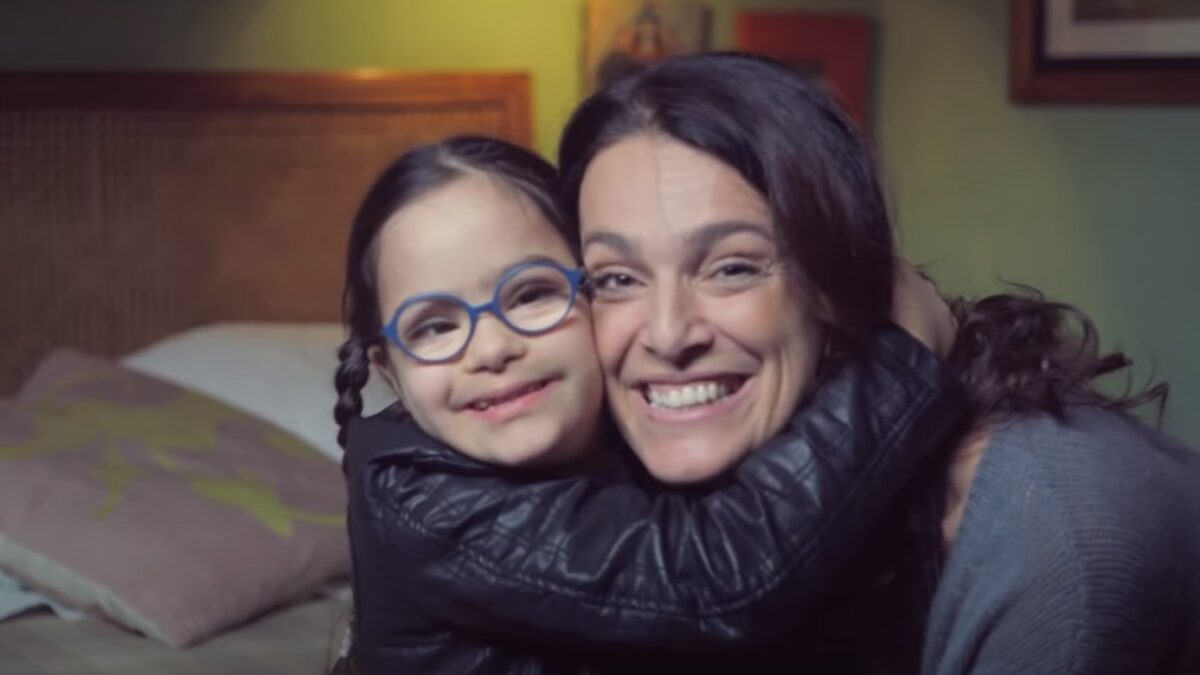On Thursday, after a long legal battle, the European Court of Human Rights (ECHR) struck a blow against free speech and dignity for people with disabilities by failing to rule in favor of a French Down syndrome advocacy organization. The court found inadmissible a petition from Fondation Jérôme Lejeune, France’s leading organization for Down’s syndrome research and care, which claimed the French state television’s 2016 decision to ban one of its messages constituted unjust censorship.
The message, a television adaptation of the video “Dear Future Mom,” offers encouragement to a mother expecting a baby with Down syndrome. Several individuals with the condition share some of the fulfilling moments in their lives. It ends with them embracing their mothers. The group’s goal with the video was to dispel misconceptions about people with Down syndrome.
Such an innocuous goal caused it to run afoul of the French Broadcasting Council, however. The broadcasting authority called the production “disturbing” to the consciences of some women and claimed it was not “a message of general interest.”
The ECHR ruling is morally troubling because it favors the sensibilities of post-abortive women over those of individuals who have Down syndrome and their families. It’s legally troubling because it is a blatant attack against free speech. And it’s logically troubling because though the video allegedly does not portray “a message of general interest,” it has won awards from artistic and creative organizations across Europe, including one in Cannes, and currently boasts more than 8.4 million views on YouTube. As in many such cases, the ECHR’s ruling is more about political preferences than any semblance of law or rights.
“The government should never exert pressure to silence the peaceful voices of its citizens. It is particularly egregious that the censored voices, in this case, were those of persons with Down syndrome. This outcome sends the signal that persons with disabilities are somehow less worthy of being seen and heard in the public square,” said Elyssa Koren, director of legal communications for ADF International, the legal advocacy group representing Fondation Jérôme Lejeune. “The implication here is that the voices of Down syndrome advocates do not merit ‘general interest,’ which serves only to contribute to a culture of discrimination.”
This is by no means the first time European courts have exerted naked politics. Last year, after Poland endeavored to reform its judiciary, still plagued with communist-era cronyism, the ECHR attempted to impose its political will on the country with a ruling that violated the Polish constitution. Spain, having enacted very similar reforms, suffered no such scrutiny. The ECHR is just one of the European institutions that have displayed little hesitation in overstepping their constitutional boundaries.
Yet, the Lejeune case sets a particularly unacceptable precedent because it denies support to a vulnerable group — an actually vulnerable group that doesn’t have an annual pride month sponsored by transnational corporations. This calls for particular vigilance in support of these vulnerable fellow citizens, as the European bureaucratic apparatus, vocally antagonistic in matters of life and family, seems to offer, at best, a relegated place for them in the Europe of tomorrow.
European bureaucrats need not look far for inspiration for such a chilling societal development. It is visible just 1,300 miles away from the EU Parliament, on the same continent, in a country that is subject to virtually all EU laws through its membership in the European Economic Area.
Iceland, with its minuscule and isolated population — and therefore understandably familiar relationship with genetic testing (cousin-marriage is an uncomfortably realistic possibility there) — has been a pioneer in tacit euthanasia.
Icelandic law mandates that pregnant women be offered prenatal screening tests for genetic abnormalities, and 80-85 percent of mothers undergo them. The abortion rate of babies designated likely to have Down syndrome is nearly 100 percent. One to three children with Down syndrome are born in Iceland in an average year. So sensitive was the Icelandic government to international reports on this topic that, in 2018, it released a press statement clarifying that it does not prevent mothers from giving birth to children with Down syndrome.
Kári Stefánsson, neurologist and founder of deCODE genetics, Inc., a company that has analyzed the genetics of virtually the entire Icelandic population, admits, “My understanding is that we have basically eradicated, almost, Down syndrome from our society — that there is hardly ever a child with Down syndrome in Iceland anymore.” He adds, “It reflects a relatively heavy-handed genetic counseling … and I don’t think that heavy-handed genetic counseling is desirable. … You’re having impact on decisions that are not medical, in a way.”
One need not be especially imaginative to envision such a “heavy-handed” approach in continental Europe. EU bureaucrats have been clear in their support for abortion on demand. Their commitment to “human rights” extends only to those who are politically convenient. Europeans living with Down syndrome, and their loving mothers, seem not to meet that definition.
Don’t buy the rhetoric coming out of Brussels about human rights or rule of law. Those who find themselves on the wrong side of the political fence will be left to their own devices. Thus, it is especially important that private organizations energetically engage in efforts like “Dear Future Mom.” Such efforts might provide the only voice available to those who need it most.









